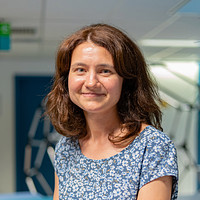Nanotechnology focuses on materials with a length scale of 1 to 100 nm, where traditional disciplines as physics, chemistry and engineering converge. It is the ability to control the structure of matter on that small scale, that allows us to develop novel materials and products, which will impact a wide range of application areas.
Nanotechnology is beyond doubt the technology of the future and is prospected to offer novel solutions to the grand challenges we face today!
Nanotechnology is beyond doubt the technology of the future and is prospected to offer novel solutions to the grand challenges we face today: (green) energy harvesting, information technology, homeland security, clean water, sufficient food production, but also new avenues towards treatment of human diseases, such as cancer, neurodegenerative diseases, diabetes, etc.
Saxion is the first University of Applied Sciences in the Netherlands with a research group in Nanotechnology. Its activities embody Saxion’s vision of a strong profile in Living Technology.
NanoPhysics
The NanoPhysics research group, headed by dr.ir. Cas Damen, aims to bridge the gap between fundamental technology developed at research centres, such as the MESA+ institute at the University of Twente, and applications based on societal challenges. The focus is on implementation of chip-based technologies. Specifically, the following technologies are being studied:
- Integrated photonics
- Microfluidics
- Micro-electromechanical Systems (MEMS)
The Nanotechnology research group emerged from a joint initiative with Mesa+ Institute for Nanotechnology, University of Twente.
The Nanotechnology research group serves as a meeting point for students, staff, researchers and industry.
Nanotechnology service centre
The Nanotechnology research group serves as a meeting point for students, staff, researchers and industry. The department acts as a low-threshold service center, where students and industry can use nanotechnology-specific equipment and can work jointly on advanced research projects. A total project cycle is implemented, from conceptualization through product patent to development. Students of the nanotechnology study program are actively encouraged to contribute.
Foundries (aluminium, steel and iron) use moulds, in which the metal is poured in in liquid form, in order to take on the shape of the mould. These molds are produced with sand and a so-called binder. Usually this binder is an organic compound, which often is toxic. Especially in case of metal casting this results in the release of highly toxic substances in gaseous form. In this project GietechGo we aim to introduce inorganic binders in three different foundries in the provinces of Overijssel and Gelderland in the Netherlands.
Saxion is partner in this project, headed by Fontys. More information will follow soon.
Duration
The project runs from 1st September 2017 until 31st August 2022.
Project manager: Cas Damen, E: [email protected]
Holland High Tech: HiTMat Sensor System for Early Detection of Veterinary Diseases
Sensor System for Early Detection of Veterinary Diseases
Many (veterinary) diseases are accompanied by the secretion of Volatile Organic Compounds (VOCs) in a specific composition. Detection of this VOC mixture in very low concentrations could help early detection, with possibilities for curing and prevention of spreading. To this end, the availability of a versatile, cheap, and yet very sensitive electronic nose system is needed. Such a system would consist of a generic sensor platform, based on micro- or nanotechnology in order to make it sufficiently sensitive, coated with capture layers, specific for the application. Because the capture layers cannot be made 100% specific for a given VOC, the readout of an array of sensors, each coated with a different layer, will have to be processed to yield a fingerprint of the composition of the mixture. This system is mimicking the way the (human) olfactory system works, where a pattern of responses from various odorant receptors in the nose is recognised as a specific smell. Hence, the name of an electronic nose.
Early detection of diseases is only one of the many challenges in society where cheap, yet sensitive sensor platforms for VOC detection in air would be of great benefit. Over the years, applications have been identified in prevention of food spoilage (rotting of crop), forensics (laboratories for synthetic drugs, explosives), safety (CO detection in low concentrations at home, wearable chemical sensors in plants, forest fires), to preventive maintenance (changes in VOC composition to indicate lubrication wear-out).
To this end, the applicants have taken up the challenge to try and write a proposal to be submitted in a PPS call in 2020, aimed at developing a cheap, yet very sensitive VOC detection system based on electronic nose principles. The aim is to bring together experts, both from industry and from science, in the fields of sensor devices, chemistry of functional thin layers, read-out electronics and data processing. In this HiTMaT project we plan to carry out a pilot study to check the feasibility and the current attainable accuracy with existing state-of-the-art technologies, which have never been combined to be used as VOC sensors.
Project
In the proposed project we plan to pursue three separate goals:
First, we want to study the ultimate sensitivity of the combination of a photonic sensor platform (specifically a MicroRingResonator, or MRR), designed and manufactured by LioniX International BV, which will be functionalised with a capture layer made of polymer brushes. To this end, the chemistry of the polymer brushes needs to be modified at the University of Twente, in order to allow them to adhere to the Si3N4 top layer of the MRR device. Subsequently, a series of measurements needs to be carried out by Saxion University of Applied Sciences, in order to determine the ultimate sensitivity of the complete system towards acetone vapour at low concentrations (<10 ppm).
Secondly, we want to analyse the composition of a number of gas samples obtained via Avivet, derived from blood lice infected stables. This analysis should provide us with a rough understanding of the specific VOCs to be detected and at what levels they are present.
Finally, we want to dedicate part of the available budget and time to bringing together relevant partners within the Netherlands, both from Science and from Industry, to prepare the consortium for the PPS proposal, currently envisioned to be submitted in 2020. With many of the potential partners already a collaboration or in-depth discussion about this idea are in place, so there is a solid base to start from.
Projectleider: Cas Damen
Looptijd: november 2019 -november 2020
More information on this project will follow.
Duration
The project runs from March 11, 2019 until March 10, 2023.
- Antibacterial nanostructured surfaces
- BIOFOS
- Characterisation of medicine mixtures
- Future pipe
- Textile in health care
- Magneto hyperthermia
- Spectra@Phone
- Cost effective lab on a chip technology for SMEs
- Nanotechnology from lab to industry
- Innovation photonics education (continuation)
- Innovation photonics education
- EU Cost action
- BioVolt
- Optical NanoSensors for biomarker detection (ONS-BIO)
- TFF Electronic Nose Sensor for potato monitoring
- RAAK MKB ONS-BIO: More information on this project will follow soon. Duration: The project runs from 1st April 2016 until 31st March 2018. Project manager: Gerald Ebberink, E: [email protected]. Project coordination: Jonathan Montanes, E: [email protected].
-
Pioneers in Health Care "CHARMM3": More information on this project will follow. Duration: The project runs until December 31, 2018.
Why study nanotechnology?
Nanotechnology today plays a very important role in our lives and will undoubtfully increase its impact in the future. Whether in food, medicine, the environment, cosmetics or electronics, nanotech is the technology of the future! Consider the iPod, chemotherapy without side effects, self-cleaning glass windows and scratch resistant automotive paints. These are all nanotechnology enabled products. None of these would be there without nanotechnology. This is the reason why you want to study nanotechnology.
Nanotechnology specialization
If you are studying a BSc course in Biology and Medical Laboratory Research, Chemistry, Electrical Engineering, Applied Physics or Mechanical Engineering at Saxion, you may decide to take on the Nanotechnology study program, as a specialization within your BSc program. From the third year of your BSc course, you will dive into the world of nanotechnology. This implies taking a number of subjects in nanotechnology, doing a Living Technology project at one of the Nanotechnology lectorates, and choosing a nanotechnology-related subject for your internship and final thesis work.
MSc Applied Nanotechnology
You can also go for the MSc Applied Nanotechnology course. This involves a 2-year MSc-level training in different subjects of applied nanotechnology research including numerous hands-on practicals (including cleanroom work) and projects related to ongoing research work in the research groups NanoBio and NanoPhysicsInterface.
See the Equipment page for the equipment used by the research group NanoPhysicsInterface.
News about this research group
Contact
The Nanotechnology research group and the study programme Nanotechnology are part of the School for Life Science, Engineering & Design of Saxion.
The team

dr. ir. Cas Damen
Lector Applied Nanotechnology

dr. ir. Aleksandar Andreski
Associate Lector Applied Nanotechnology

Gerald Ebberink, MSc
Researcher/project leader

Gerard Heesink
Senior reseacherlecturer NanoPhysics

Saara-Maarit Reijn
Researcher/ lecturer NanoPhysics

Tom Rikkers
Employee Education and Research

dr. ir. Rory Dijkink
Lecturer/researcher

dr. Ir. Tjeerd Bollmann
Senior researcher/lecturer
Romas Zubavicius
Junior researcher NanoPhysics

dr. Yulia Tykhonenko Polishchuk
Lecturer/researcher/project leader